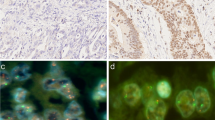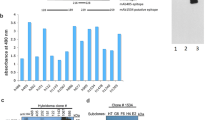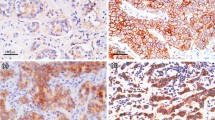Abstract
To evaluate the significance of murine double minute 2 (MDM2) oncoprotein in human breast cancer as a nuclear-cytoplasmic shuttling protein, an estrogen receptor (ER) alpha regulator, and a prognostic marker and to study how MDM2 is overexpressed, we investigated its status in tissue samples and examined the correlation between overexpression and MDM2 gene abnormalities, status, and clinicopathological parameters. We detected MDM2 oncoprotein in both nucleus and cytoplasm by frozen-section immunohistochemistry. There was a significant correlation between MDM2 overexpression and low-grade nuclear atypia, absence of lymph node involvement, and increased levels of ER alpha protein. Our molecular assays found no point mutations in Ser17, but there was a correlation between MDM2 overexpression and the lack of splice variant mRNAs. These results suggest that the distribution of MDM2 reflects its nuclear-cytoplasmic shuttling ability; that interaction between p53 and MDM2 for tumor progression is not enhanced by point mutations at codon 17; and that the expression of MDM2 splice variants is a reason for the lack of its overexpression. MDM2 overexpression correlates with favorable prognostic parameters. A decreased level of MDM2 will lead to a deviation from the ER alpha signaling pathway.
Similar content being viewed by others
REFERENCES
Karnik PS, Kulkarni S, Liu X-P, Budd GT, Bukowski RM: Estrogen receptor mutations in tamoxifen-resistant breast cancer. Cancer Res 54: 349–353, 1994
Hori M, Iwasaki M, Yoshimi F, Asato Y, Itabashi M: Determination of estrogen receptor in primary breast cancer using two different monoclonal antibodies, and correlation with its mRNA expression. Pathol Int 49: 191–197, 1999
Hori M, Iwasaki M, Yoshimi F, Asato Y, Itabashi M:Hypermethylation of the estrogen receptor alpha gene is not related to lack of receptor protein in human breast cancer. Breast Cancer 6: 79–86, 1999
Nass SJ, Herman JG, Gabrielson E, Iversen PW, Parl FF, Davidson NE, Graff JR: Aberrant methylation of the estrogen receptor and E-cadherin 5_ CpG islands increases with malignant progression in human breast cancer. Cancer Res 60: 4346–4348, 2000
Horwitz KB, Jackson TA, Bain DL, Richer JK, Takimoto GS, Tung L: Nuclear receptor coactivators and corepressors.Mol Endocrinol 10: 1167–1177 (minireview), 1996
Endoh H, Maruyama K, Masuhiro Y, Kobayashi Y, Goto M, Tai H, Yanagisawa J, Metzger D, Hashimoto S, Kato S: Puri-fication and identification of p68 RNA helicase acting as a transcriptional coactivator specific for the activation function 1 of human estrogen receptor α.Mol Cell Biol 19: 5363–5372, 1999
Yu CL, Driggers P, Barrera-Hernandez G, Nunez SB, Segars JH, Cheng S: The tumor suppressor p53 is a negative regulator of estrogen receptor signaling pathways. Biochem Biophys Res Common 20: 617–620, 1997
Kussie PH, Gorina S, Marechal V, Elenbaas B, Moreau J, Levine AJ, Pavletich NP: Structure of the MDM2 oncoprotein bound to the p53 tumor suppressor transactivation domain.Science 274: 948–953, 1996
Roth J, Dobbeistein M, Freedman DA, Shenk T, Levine AJ: Nucleo-cytoplasmic shuttling of the hdm2 oncoprotein regulates the levels of the p53 protein via a pathway used by the human immunodeficiency virus rev protein. EMBO J17: 554–564, 1998
Sobin LH, Wittekind Ch (eds): International Union Against Cancer, 'TNM Classification of Malignant Tumours'. 5th edn, Wiley-Liss, New York, 1997, pp 123–130
Tsuda H, Akiyama F, Kurosumi M, Sakamoto G, Watanabe T: Monitoring of interobserver agreement in nuclear atypia scoring of node-negative breast carcinomas judged at individual collaborating hospitals in the national surgical adjuvant study of breast cancer (NSAS-BC) protocol. Jpn J Clin Oncol 29: 413–420, 1999
Johnston SRD, Saccani-Jotti G, Smith IE, Salter J, Newby J, Coppen M, Ebbs SR, Dowsett M: Changes in estrogen receptor, progesterone receptor, and pS2 expression in tamoxifen-resistant human breast cancer. Cancer Res 55: 3331–3338, 1995
Hori M, Shimazaki J, Inagawa S, Itabashi M, Hori M: Alternatively spliced MDM2 transcripts in human breast cancer in relation to tumor necrosis and lymph node involvement. Pathol Int 50: 786–792, 2000
Oliner JD, Kinzler KW, Meltzer PS, George DL, Vogelstein B: Amplification of a gene encoding a p53-associated protein in human sarcomas. Nature 358: 80–83, 1992
Watanabe T, Hotta T, Ichikawa A, Kinoshita T, Nagai H, Uchida T, Murate T, Saito H: The MDM2 oncogene overexpression in chronic lymphocytic leukemia and low-grade lymphoma of B-cell origin. Blood 84: 3158–3165, 1994
Landers JE, Haines DS, Strauss JF, George DL: Enhanced translation: a novel mechanism of mdm2 oncogene overexpression identified in human tumour cells.Oncogene 9: 2745–2750, 1994
McCann AH, Kirley A, Carney DN, Corbally N, Magee HM, Keating G, Dervan PA: Amplification of the MDM2 gene in human breast cancer and its association with MDM2 and p53 protein status. Br J Cancer 71: 981–985, 1995
Bueso-Ramos CE, Manshouri T, Haidar MA, Yang Y, Mc-Cown P, Ordonez N, Glassman A, Sneige N, Albitar M: Abnormal expression of MDM-2 in breast carcinomas. Breast Cancer Res Treat 37: 179–188, 1996
Baunoch DA, Watkins LF, Tewari A, Reece MT, Adams L, Stack R, Brown A, Jones L, Christian D, Latif NA, Lawrence WD, Lane MA: MDM2 overexpression in benign and malignant lesions of the human breast: association with ER expression. Int J Oncol 8: 895–899, 1996
Marchetti A, Buttitta F, Girlando S, Palma PD, Pellegrini S, Fina P, Doglioni C, Bevilacqua G, Barbareschi M: Mdm2 gene alterations and mdm2 protein expression in breast carcinomas. J Pathol 175: 31–38, 1995
Liu G, Schwartz JA, Brooks SC: Estrogen receptor protects p53 from deactivation by human double minute-2. Cancer Res 60: 1810–1814, 2000
Mayo LD, Turchi JJ, Berberich SJ: Mdm-2 phosphorylation by DNA-dependent protein kinase prevents interaction with p53. Cancer Res 57: 5013–5016, 1997
Silva J, Silva JM, Dominguez G, Garcia JM, Rodriguez O, Garcia-Andrade C, Cuevas J, Provencio M, Espana P, Bonilla F: Absence of point mutations at codon 17 of the Mdm2 gene (serine 17) in human primary tumors. Mutat Res449: 41–45, 2000
Zhang Y, Yue X: Mutations in human ARF exon2 disrupt its nuclear localization and impair its ability to block nuclear export of MDM2 and p53. Mol Cell 3: 579–591, 1999
Author information
Authors and Affiliations
Rights and permissions
About this article
Cite this article
Hori, M., Shimazaki, J., Inagawa, S. et al. Overexpression of MDM2 oncoprotein correlates with possession of estrogen receptor alpha and lack of MDM2 mRNA splice variants in human breast cancer. Breast Cancer Res Treat 71, 77–84 (2002). https://doi.org/10.1023/A:1013350419426
Issue Date:
DOI: https://doi.org/10.1023/A:1013350419426




